 “People have been asking for a more ‘guitar driven’
album from me for years – now is the time,” explains
JW-Jones regarding Bluelisted. As NorthernBlues’
longest standing artist, he has recorded a total of
five discs for the label including their very first
CD in 2001.
“People have been asking for a more ‘guitar driven’
album from me for years – now is the time,” explains
JW-Jones regarding Bluelisted. As NorthernBlues’
longest standing artist, he has recorded a total of
five discs for the label including their very first
CD in 2001.
J-Dub gets better and better with each
release, and Bluelisted is no exception. The
veterans of the blues scene have taken a shining to
singer/songwriter/guitarist Jones as seen by the
highly respected guests on this CD. He has wisely
taken advantage of that situation to mature as a
musician.
Guest guitarists Little Charlie Baty and Junior
Watson appear together on the same tracks for the
first time in recorded history. The three remarkable
guitarists all have a similar style and they play
magnificently off of each other on six songs. Guitar
enthusiasts will be thrilled to know that the
credits clarify which artist performs which guitar
solo. Other venerable guests include Richard Innes
(drums) and Larry Taylor (bass), who have both spent
time with The Mannish Boys.
Bluelisted contains ten
originals and four covers, and was produced by
Jones. If you like stylish guitar and bouncy
grooves, with gently played drums, then this is the
CD for you. Yet, you’ll hear more than fat-toned
guitar. In the liner notes Dan Aykroyd states,
“Clearly Mr. Jones is conversant in the Westside and
the Southside styles and sound.”
Guitar solos are frequently heard, but none of them
contain a ton of notes. Sensibly, each comes loaded
with the proper amount of artillery. The Freddie
King popularized "Double Eyed Whammy" isn’t a kick ass
and rockin’ version like Tinsley Ellis recorded in
the late ’80s. Rather, it becomes a West Coast
swinging guitar fiesta. "Heavy Dosage" is a jazzy
instrumental and "Wasted Life" is a take on "Who’s
Loving You Tonight."
Baty’s harp on
"Out Of Service
Blues" is a nice change from all the six-stringing.
"Looking The World Straight In The Eye" is funky and
greasy, with a bit of Texas thrown in for good
measure. The tempo changes, within the song, keeping it
interesting to listen to and complex to perform.
You
can almost smell the barbeque on the tasty licks
present on the shufflin’ "Can’t Play A Playboy." A
honking sax creates a house party on "Mad About You"
where a stomping boogie is driven by the pulsating
horn section. Jesse Whiteley’s piano is impressive
on "The Doctor" and a couple other tracks.
Blues musicians do not usually receive their due
acclaim until well in their senior years. Though he
may be playing his scintillating swing blues into
his retirement years, 28-year-old JW-Jones isn’t
planning to wait until then to make his mark on the
industry. This CD could be considered the Showdown!
CD of white, West Coast-style guitarists. Jones’
vocals have a boyish charm, but they require further
enhancements in order to match his guitar skills.
Overall, this youthful artist’s music will attract a
younger audience to the blues, and that is exactly
what the genre needs.
--- Tim Holek
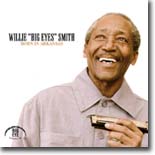 Willie "Big Eyes" Smith played traditional shuffle
style drums for 15 years with Muddy Waters. Later,
he co-founded the Legendary Blues Band with other
Waters Band alumni. Smith, who hails from Helena,
Arkansas, has been a solo artist since 1995.
Willie "Big Eyes" Smith played traditional shuffle
style drums for 15 years with Muddy Waters. Later,
he co-founded the Legendary Blues Band with other
Waters Band alumni. Smith, who hails from Helena,
Arkansas, has been a solo artist since 1995.
The core of the extraordinary band backing Smith on
Born In Arkansas (Big Eye) includes Bob Stroger (bass) and
Little Frank Krakowski (guitar). They are one of the
finest Chicago blues bands that you will hear. With
the reins of Chicago’s most authentic old school
drumming handed down to his son Kenny “Beedy Eyes”
Smith, who is as outstanding as his father is on the
skins, Willie confidently concentrates on harmonica,
his first instrument. Smith is not a sonic harp
wailer but rather he plays it softly and
melodically. He draws on many of his life
experiences for the topics of the 13 original songs.
His ordinary vocals are genuine though they are not
exceptional. It’s the songs and musicianship that
stand out on this scintillating traditional blues
album.
Throughout, Billy Flynn plays sharp, short, and
strong notes on guitar. Even though he isn’t
credited for playing mandolin, you can hear mandolin
on a few songs. Barrelhouse Chuck’s rolling and
jingling piano fills gaps tighter than fresh asphalt
on "Rub My Back." His ’60s psychedelic sounding organ
illustrates what the first blues/rock bands sounded
like on "Old Woman Sweetheart." The song’s lyrics
present the advantages of older women and having a
relationship with one of them.
"Dreamin’" is an
instrumental that features pure harp with incredible
tone that is similar to the tone produced by James
Cotton. "Sitting Here Drinkin’" is a modern day uptake
based on the classic "Sloppy Drunk." A Muddy Waters
influence is also found on "Can’t Rest For Worry"
where Smith sings (“Can’t sleep for cryin’/can’t be
satisfied”). Other old and familiar lyrics
(“Troubles in the east/troubles in the west”) are
given a facelift on "World In An Uproar." On the title
track, Smith sings he was (“Born in Arkansas on a
country farm”). It’s a country blues tune that is
ignited with power.
Even though the 13 songs are all fairly similar,
it’s a pleasure to hear this dying brand of blues
properly performed. This is old-style electric
Chicago blues performed with fireball keyboards,
burst-full harp, and precisely delivered guitar.
Regardless of what today’s media would like you to
believe what blues music is, this CD is the real
deal.
--- Tim Holek
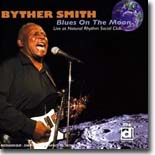 Byther Smith’s life has left him with many scars. He
lost both his parents while still a child in
Monticello, Mississippi. As a young man, surviving
family members shipped him off to Arizona. There, he
took up boxing in part to deal with the pain. By the
early ’60s he had moved to Chicago and was playing
Theresa's Lounge, where he backed Junior Wells. Via
songs that contain pain and torment, he puts his
scars on display.
Byther Smith’s life has left him with many scars. He
lost both his parents while still a child in
Monticello, Mississippi. As a young man, surviving
family members shipped him off to Arizona. There, he
took up boxing in part to deal with the pain. By the
early ’60s he had moved to Chicago and was playing
Theresa's Lounge, where he backed Junior Wells. Via
songs that contain pain and torment, he puts his
scars on display.
There is a peculiar attraction to
the unattractiveness of Smith’s rugged music on his
first live recording, Blues On The Moon (Delmark). It was recorded at the small
south side Chicago club, the Natural Rhythm Forty
And Over Social Club. First-rate support is provided
by Jimmy Burns’ regular band of Anthony Palmer
(rhythm guitar), Greg McDaniel (bass), James Carter
(drums), and Daryl Coutts (keyboards). Together, the
Smith originals naturally flow out of these guys.
Coutts roams the most, but his breathtaking
improvisations are a bit self-fulfilling.
Easily the best song is
"Judge Of Honor." It has a
catchy wall of sound that’s rich in time-tested,
electric Chicago blues. On it, Smith’s rusty and
weathered vocals attest to years of living the real
deal blues lifestyle. Smith maintains a certain
pride especially when singing the words to the title
track, (“I’m so proud of America, I’ll play the
blues standing’ on the moon.”) However, the song’s
repetitive rhythm is too monotonous. Repetition will
practically hypnotize you during "Give Up My Life For
You" which reminds us (“Baby Jesus died/He died for
this world.”) It’s a slow-paced, gritty groove,
where the band comes together as a tight and
cohesive unit. It’s simply one of the heaviest cuts
on the recording.
Classic ’50s-style Chicago blues
appears on "If I Misused Someone." Minor key
"Monticello" is autobiographical in nature. When Smith
frantically sings (“Monticello so lonely”), you
sense the anguish and torture produced from being
left alone. He strays from the usual arrangement of
"Don’t Start Me Talkin’"; however, it features some of
his best guitar work.
Delmark’s core business is not cinematography so
this DVD doesn’t rate the same as a Live At Montreux
DVD. The club’s shoebox layout was not an ideal
setting to film a band. There is no stage (a pool
table normally occupies the spot where the band set
up) and the lighting is poor. The band has to cram
into a compressed area. Little space is left to set
up the cameras. As a result, the camera views,
especially from the mobile camera, are too close.
Smith looks as mean as his tough blues sound. Yet,
extreme close-ups of his face, which fill the entire
screen, are not needed. The DVD includes one bonus
track and a running commentary where Smith is
interviewed by co-producer Steve Wagner. By means of
the commentary and David Whiteis’ liner notes, you
learn more about Smith than any biography written
about him.
There are several shining moments, but overall these
mostly original songs aren’t very memorable and
neither are the vocals. However, the band is
confident and the guitar solos are slashing. Some
songs kick and bite, e.g., "Hard Times," while others
e.g., "Rock Me Baby" are in need of an energy boost.
Blues is best experienced live. The DVD fails to
capture what emanates off the CD.
--- Tim Holek
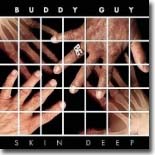 If the
Buddy Guy you first knew or liked was the
Damn Right I’ve Got The Blues Buddy Guy, then
Skin Deep (Silvertone) is the CD you’ve been
waiting for. After some less than memorable releases
– namely Sweet Tea and Bring ’Em In –
Buddy Guy is back on top. With regards to the songs
and guests, Skin Deep is every bit as good as
Damn Right… . However, it features more of
Guy’s wildly speedy guitar playing, and this time
the message of the songs is deeper. The inspiration
for the album title and song comes from a
significant series of personal memoirs and
observations on the ways in which "underneath we're
all the same.” This time Buddy Guy had the freedom
to play what he wanted in the studio. "This is the
first time I really had more control," Guy says.
If the
Buddy Guy you first knew or liked was the
Damn Right I’ve Got The Blues Buddy Guy, then
Skin Deep (Silvertone) is the CD you’ve been
waiting for. After some less than memorable releases
– namely Sweet Tea and Bring ’Em In –
Buddy Guy is back on top. With regards to the songs
and guests, Skin Deep is every bit as good as
Damn Right… . However, it features more of
Guy’s wildly speedy guitar playing, and this time
the message of the songs is deeper. The inspiration
for the album title and song comes from a
significant series of personal memoirs and
observations on the ways in which "underneath we're
all the same.” This time Buddy Guy had the freedom
to play what he wanted in the studio. "This is the
first time I really had more control," Guy says.
The
success of the album can be attributed to the
veteran studio musicians like Reese Wynans
(keyboards). The greatest credit must be given to
Tom Hambridge – known for his work with Delbert
McClinton, Johnny Winter, and Susan Tedeschi – who
produced the CD, contributed all but two songs, and
performed drums. Guy’s vocals are usually
thunderous, but they lack energy on the opening song
"Best Damn Fool." He more than compensates for the
deficiency by putting everything he has got into a
scintillating guitar that vibrates its way into your
blues bloodstream.
"Lyin’
Like A Dog" is a dirty blues with lots of jolting
guitar notes. Here, Guy delivers a rant of bad love
with the expressive, energetic, and expressive
vocals we have come to expect. This seven-plus
minute opus gives merit that Guy is still one of the
best blues guitarists on the scene. "Show Me The
Money" is a rockin’ boogie that sounds highly
produced especially the background vocals. As the
remaining real deal bluesmen fall victim to
attrition, "Who’s Gonna Fill Those Shoes" describes
a real predicament. The song itself does not propose
any answers to the question, but rather it urges the
listener to dictate the future of the blues.
Cleverly, hope for the future is delivered on the
track via pre-teen guitar whiz Quinn Sullivan.
The
contemporary rock song "Too Many Tears" is fueled by
Derek Trucks’ slide guitar and Susan Tedeschi’s
vocals. "Every Time I Sing The Blues" is a perfect
partnering of rock’s greatest blues advocate – Eric
Clapton – with the blues’ greatest rock advocate –
Buddy Guy. The lyrics and arrangement of "Out In The
Woods" are made to sound rural thanks to an
accompanying accordion of Nathan Williams. Here,
Robert Randolph’s pedal steel guitar is absolutely
wicked. He cuts heads with Guy again on "That’s My
Home."
Along
with the occasional pop song, e.g., "Hammer And A
Nail" that could have been omitted, there is plenty
of rock and blues on this CD. Broad-minded music
enthusiasts will love this release which expands the
borders of the blues.
---
Tim Holek
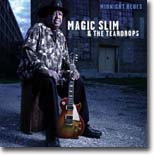 It was
my pleasure to be the handler for Magic Slim
at this year’s Blues Music Awards and a nicer man
you’ll never meet. So it was a treat to get Slim’s
latest record, Midnight Blues, in the mail
from Blind Pig Records. Slim put out the word that
he was looking for a few extra “Teardrops” for this
record and a number of his friends answered the
call. James Cotton, Otis Clay, Lil’ Ed, Lonnie
Brooks, Elvin Bishop and Gene Barge are all friends
who answered the call to contribute their talents to
Magic Slim’s latest project. The result is a rocking
good time and a disc that is highly recommended.
It was
my pleasure to be the handler for Magic Slim
at this year’s Blues Music Awards and a nicer man
you’ll never meet. So it was a treat to get Slim’s
latest record, Midnight Blues, in the mail
from Blind Pig Records. Slim put out the word that
he was looking for a few extra “Teardrops” for this
record and a number of his friends answered the
call. James Cotton, Otis Clay, Lil’ Ed, Lonnie
Brooks, Elvin Bishop and Gene Barge are all friends
who answered the call to contribute their talents to
Magic Slim’s latest project. The result is a rocking
good time and a disc that is highly recommended.
The
first cut up is a Magic Slim original, “Let Me Love
You.” The familiar strains of Slim’s guitar light up
the intro to a song about respect for his woman.
“What I like about you baby…you’re all right with
me…” “Let me love you…love you babe…let me love you
baby…that’s all I can do!” James Cotton brings his
harp to the next tune, “You Can’t Lose What You
Never Had.” “You can’t lose what you ain’t got…can’t
miss what you never had…you can’t spend what you
ain’t got…can’t lose what you ain’t ever had!”
Cotton’s harp leads the way as Slim lets us know
that you just have to make do with what you have, a
good lesson to learn. “Give Me Back My Wig” is the
next tune and the slide guitar of Lil’ Ed is front
and center here. “Give me back my wig…honey let your
hair go bald…I really have no business…honey, buying
you no wig at all!” It’s hard for me to imagine
wearing a wig and letting my woman go bald, but it
works for Slim.
The
first of two Little Milton covers, “Lonely Man,” is
up next. The exuberant tones emitting from Slim’s
guitar tells me he’s having a ball recording this
song as he sings…”I want you to love me…I want you
to love me…yeah…baby…til it pleases me!” “I’ve been
so unlucky baby…I found a spider in my stew…don’t
what happened baby…I put so much confidence in you!”
Lonnie Brooks lends his guitar to this version of
the Willie Dixon tune, “Spider in My Stew.” Seems
someone is trying to do Slim harm and discourage his
love for this woman. Lonnie’s guitar work is
brilliant and Slim is appropriately suspicious of
his woman now. “Countrified” is the best way to
describe Magic Slim’s next tune, “Going Down The
Road Feeling Bad.” “My mama won’t buy no shoes…mama
won’t buy me shoes…oh, Lord…ain’t going be treated
this way…going down the road feeling bad…oh, Lord…ain’t
going to be treated this way!”
We stay
up tempo with another Slim original, “Full Load
Boogie,” an instrumental. Here Magic Slim is at his
best, picking his notes carefully and just letting
it wail. “Full Load Boogie” is a nice interlude
leading on to our next cut, “Crosseyed Cat.” Here is
seems that Magic Slim’s woman has a house cat that
doesn’t like him and something needs to go. “Every
time I go by my woman’s house…he’s in the corner,
boy…laying down…he’s too big to be a house cat…he’s
too small to be alone…I’m so sorry…got to leave that
woman alone…she’s got a cross-eyed cat…living out
there with her boy in her home!” A heavy bass line
sets the mood on our next cut, “House Cat Blues.”
Here Magic Slim is the one with the cat who’s
driving him crazy. The last line of this song says
it all, “I’m going to get me a fuzzy dog…to get that
house cat of mine…cause he’s bad…I’m going to let
him choke him!”
“I’ve
been waiting on you, Carla…babe, I’ve been waiting
all night long…yea, I’m beginning to wonder little
girl…girl, when you coming back home?” “Carla” is a
woman who obviously is stepping out on Magic Slim
and the pain she’s causing him is too much to bear.
“I’ve got to find someone….someone who can take her
place!” Elvin Bishop supplies the guitar work on our
next cut, “Cryin Won’t Let You Stay”. “When you
leave little girl…please tell me that you’re
gone…leave if you want…cryin’ won’t let you
stay…cause the more you cry….girl you’re going to
drive me away!” Elvin’s guitar is on fire and I can
see the smile on his face in my mind’s eye as he
enjoys playing on this tune for Slim. Magic Slim is
back to the guitar on another original cut, “What Is
That You Got.” “What is that you got baby…tell me,
what is that you got…whatever you got…please, Mam…lay
it on me!” Whatever she’s got must be hot, everyone
seems to want some. The final cut on the CD, “Loving
You is The Best Thing That Happened to Me,” features
Otis Clay on background vocals, Gene Barge on tenor
sax and the Chicago Rhythm & Blues Kings horn
section as Slim attacks this Little Milton tune.
Knowing Little Milton, I imagine this is a tune that
he wrote for his wife and Magic Slim does it
justice. “If I had a chance to live my life over…if
I could reset…the hands of Time…well…I want you to
know…if this could be done…without you in my
life…baby…it would be no fun…cause loving you…is the
best thing that happened to me!”
I’ve
enjoyed this new record by Magic Slim tremendously.
You can always judge a man by his peers and it’s
obvious that these Chicago players love and respect
him. Everyone played their butts off for Slim on
this record and the result will stay in my CD player
for awhile. Catch Magic Slim & the Teardrops when
you can, you’ll be hard-pressed to find another band
that loves to play live these guys do. And grab a
copy of Midnite Blues from Magic Slim while
you’re at it, he’ll be happy to sign it for you.
---
Kyle Deibler
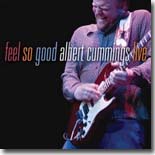 I called
Albert Cummings after I’d had the chance to
listen to Feel So Good. I told him he’d made
a great record. Albert’s latest release on Blind Pig
Records is a live recording that does a wonderful
job of capturing the essence of the guitar madman at
his best. Albert blew us away out here in Phoenix
with his seven-plus minute version of Jimi Hendrix’s
"Voodoo Chile," and Feel So Good gives the
listener a hint of what Albert’s like live. So let’s
dig into it.
I called
Albert Cummings after I’d had the chance to
listen to Feel So Good. I told him he’d made
a great record. Albert’s latest release on Blind Pig
Records is a live recording that does a wonderful
job of capturing the essence of the guitar madman at
his best. Albert blew us away out here in Phoenix
with his seven-plus minute version of Jimi Hendrix’s
"Voodoo Chile," and Feel So Good gives the
listener a hint of what Albert’s like live. So let’s
dig into it.
The
audience in the house that night at the Colonial
Theater in Pittsfield, Massachusetts was in for a
treat. Albert sets the tone from the beginning with
“Party Right Here.” “Kick off your boots, let down
your hair…let’s party like nobody cares!” And party
they did. The house is rockin’ and Albert, Aaron and
Daniel are all letting it loose. Makes me wish I’d
been there. Next up is a Delbert McClinton tune,
“Why Me,” and Albert’s obviously in over his head.
“By the time my money ran out…you know my honey was
gone…and I was crying out loud to myself as I was
walking home.” Judging by the audience response,
Albert nailed, “Why Me.” Things slow down with
Albert’s original tune, “Sleep.” “Sleep” is a new
song of Albert’s to me and his intricate guitar work
on this tune is reminiscent of Santana. “Night
time…it's time for sleep…while you rest…my love
you’ll keep…on your pillow…rest your head…while you
dream…of the days ahead!” This may be a song that
Albert wrote for his children and it’s beautifully
done.
We move
on to the “Hoochie Coochie Man/Dixie Chicken” medley
that Albert just lights up. I particularly like his
version of “Dixie Chicken” and the audience is
jumping. “And I don’t remember church bells…money I
put down…on a white picket fence and boardwalk…on a
house at the edge of town…but boy did I remember…the
strain of her refrain…and the nights we spent
together…and the way she called my name…” The
audience has the chorus to this Little Feat tune
down pat and Albert calls for a second…”you can be
my Dixie chicken…I’ll be your Tennessee man…we can
walk together…down in Dixie land!” A slow, thumping
bass line from Daniel Broad leads us into
“Barrelhouse Blues,” a tune written by Chris Layton
and Tommy Shannon. “You can cry out her name…but she
can’t hear you call…she’s had enough…enough of it
all…you can crawl on your knees…to your mama’s front
door…she can’t hear you no more.” This relationship
is definitely over and there’s no going back.
Albert
is definitely an outspoken man and sometimes it gets
him into trouble. He lets us know why on “Tell It
Like It Is.” “Well I never…never hold back…I always
tell it like it is…if I hurt your feelings…you’re
too sensitive!” I can definitely speak from my
experiences with Albert on this one. Albert, you do
tell it like it is, you SOB!! Props from Phoenix!!
“Rock Me Baby” is the next tune on this musical
adventure and we’re in high gear now. “I want you to
rock me baby…rock me all night long…I want you to
rock me baby…like my back ain’t got no bone…baby!” I
seriously doubt that B.B. King ever envisioned the
house-rockin' version that Albert and the boys are
playing for us here. Another Cummings original,
“Your Own Way,” is up next. “You never…never judge a
book by its cover…there’s so much more…you might
discover!”
The rock
in Albert’s life is his wife Christina, and
“Together As One” was written for her. “Don’t worry
about…all there is to come…just know in your
heart…that we’ll…get it done…because we…are together
as one!” A beautiful ballad, it’s nice to hear the
live version from Albert and the care he gives it.
Albert crank things back up with another original,
“Blues Makes Me Feel So Good,” and the crowd is
definitely into it. “It’s hard to feel bad…when the
blues makes me feel so good!” “You people feeling
good” is Albert’s question to the audience and they
burst out with applause in appreciation for his
music and his showmanship. Albert closes out this
energetic live album with another anthem he loves to
play, “Rock and Roll” by Led Zeppelin. A great way
to end what had to be an amazing show.
I have
to admit Albert is one of my favorite guitar players
and this live album shows Albert, Aaron and Daniel
at their best. You can grab a copy of Feel So
Good from Albert at any of his live shows or
from his website at
www.albertcummings.com. This Massachusetts home
builder/guitar hero can tear the house down when
he’s a mind to do so and he was definitely in the
mood that night in Pittsfield. Next time you throw a
party like this Albert, invite me!
---
Kyle Deibler
 Somewhere in my house I have pictures from the 2003
IBC. It was my first year as a volunteer coordinator
and along the way I met a passionate group of fans
of Robin Rogers from Charlotte, NC. Fast
forward to last year’s Women in Blues festival where
I had the opportunity to meet and hear Robin for the
very first time. The finale that night had Robin on
stage with E.G. Kight and Robin was blowing a really
mean harp. So I’m happy to see that Robin was able
to sign a recording contract with Blind Pig Records
and put out a great disc called, Treat Me Right.
Somewhere in my house I have pictures from the 2003
IBC. It was my first year as a volunteer coordinator
and along the way I met a passionate group of fans
of Robin Rogers from Charlotte, NC. Fast
forward to last year’s Women in Blues festival where
I had the opportunity to meet and hear Robin for the
very first time. The finale that night had Robin on
stage with E.G. Kight and Robin was blowing a really
mean harp. So I’m happy to see that Robin was able
to sign a recording contract with Blind Pig Records
and put out a great disc called, Treat Me Right.
The
title track happens to be the first cut on the
record and, if I close my eyes, Robin has the same
vocal strength that Janiva Magness is known for. So
now I know I’m in for a treat. “Oh baby…you know my
love is true…oh baby…you know my love is true…well I
do everything…everything you taught me to…you won’t
do nothing…try to make me blue…oh baby…you know you
ought to treat me right!” Robin’s a strong woman and
if she’s not treated right, she will move on. On our
next cut, “Don’t Leave Poor Me,” the shoe is on the
other foot. Robin’s the one who wants to hang on.
“Don’t leave poor me…I’m begging on my knees….don’t
leave poor me…have mercy please!” Robin is
definitely in love with her man and she’s not
letting go easily. A sweet piano intro by Mark
Stallings leads us into “Ain’t No Use,” where we
find Robin is just tired of the man she’s with.
“Ain’t no use baby…you’re too doggone mean…yes I’m
tired of paying dues…having the blues…it ain’t no
use baby!”
“Can You
Hear Me Now” is an original written by Robin and her
husband Tony and opens with Robin on the harp. “Can
you hear me now…as I’m walking out the door…years of
tears don’t count…cause you never heard a word…oh I
finally bottomed out…I don’t love you anymore…can
your hear me now…as I’m walking out the door?”
Robin’s man cheated on her for years and she’s
reached that point where enough’s enough. Good for
her! Our next tune, “Color-Blind Angel,” pays homage
to Viola Liuzzo; a civil rights heroine murdered by
the KKK and earned Robin a second place award in the
prestigious ISC songwriting contest. Dark Delta
overtones, foot stomping underscore the sacrifice
that Viola made for her beliefs. “Color blind
angel…battled bigotry…Viola…Viola… lives on in
history!” The tempo and mood lighten with our next
song, “Promised Land.” “I’m going to the promised
land…yes, I’m a sinner but…they’ll let me in…I’m
going to the promised land….there ain’t no end…open
the gates…I’m coming home to the promised land!”
Acoustic
bass by Kerry Brooks and the trumpet work of Jon
Thornton provide the backdrop for our next cut,
“Nobody Stays.” Here we find that Robin is the only
one who believes in and fights for the relationship
she wants. “I’m so…so damn tired…you know I feel
I’ve been denied…nobody ever stays…except me!”
Robin’s husband Tony is a very accomplished
guitarist and his slide work is heard in the
background of our next cut, “Drunkard’s Alley,” a
place everyone has been at one time or another. “You
got just what you need…to take you where you want to
go…down in Drunkard’s alley…where salvation is so
hard to find. Robin’s nasty laugh in the background
belies her amusement at what can be found in
“Drunkard’s Alley.” In “Nobody’s Gonna Hurt You”,
Robin is letting her man know his heart is in good
hands. “Relax and take it easy…I’ll show you what
love’s about…and when I finish loving you baby…you
will have no doubt...nobody’s gonna hurt you, baby!”
“Don’t
it make you wanna cry…don’t it make you want to
moan…don’t it want it make you pack up your pain…and
run away from home?” In “Moan,” we find the story of
a woman who has found her man has been cheating on
her. He’s been out all over town, sleeping around
and its time to let him go. Our final cut, “Dark
Love,” opens with an appropriately mystical B3 intro
from Mark and more trumpet from Jon. “Oh baby…you’re
begging forgiveness…like a sinner…begs a saint…oh
baby…I just can’t believe you…caught you
cheating…with my best friend…dark love…I don’t have
the answer…I’m stuck here…between stay and go!” Her
trust broken, Robin reaches the only logical
conclusion she can, its time for her to go.
Treat
Me Right is a very impressive debut for Robin on
Blind Pig. She’s definitely a star on the rise
although she’s been performing for close to 30 years
now. Her band is rock solid behind her and her vocal
strength is amazing. We’ll be hearing more good
things from Robin and her band for a long time to
come. And that’s a good thing!
---
Kyle Deibler
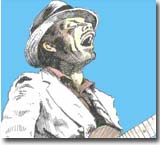 Fontaine Brown cut his first single at Chess
Studios in 1962 (for Chess’ Checker subsidiary),
produced some of Bob Seger’s ’60s singles, served an
apprenticeship under Motown songwriting legend
Mickey Stevenson, played with the band Southwind
(who recorded two albums for Blue Thumb), plus he’s
done production work and has compiled a 200+ song
catalog that includes songs recorded by Dave
Edmunds, Percy Sledge, John Mayall, Emmylou Harris,
Joe Louis Walker, James Armstrong, and Dave Alvin
(and sampled by Gorillaz). Let’s just say he
probably knows his way around the music scene.
Fontaine Brown cut his first single at Chess
Studios in 1962 (for Chess’ Checker subsidiary),
produced some of Bob Seger’s ’60s singles, served an
apprenticeship under Motown songwriting legend
Mickey Stevenson, played with the band Southwind
(who recorded two albums for Blue Thumb), plus he’s
done production work and has compiled a 200+ song
catalog that includes songs recorded by Dave
Edmunds, Percy Sledge, John Mayall, Emmylou Harris,
Joe Louis Walker, James Armstrong, and Dave Alvin
(and sampled by Gorillaz). Let’s just say he
probably knows his way around the music scene.
Tired of
having “no fixed address” and years of endless
touring, Brown dropped off the radar as a performer,
but remained in demand as a songwriter over the past
25 years. Recently, he jumped back into performing
with the release of Tales From The Fence Line
(Manatee Records), an appealing mix of pop, country,
and blues with a few surprises thrown in for good
measure.
Despite
the mixing of genres, the disc falls together pretty
seamlessly, from the driving rock of the opening
cut, “Ain’t No Brakeman,” and “Wreck At The
Crossroads,” to the highly personal title track,
which recounts those frustrating days of endless
touring. “Detroit Saturday” is another hard-rocking
tune, punctuated by Brown’s harmonica, and “Love
Come Rescue Me” sounds like a long lost Memphis soul
classic. “Southside Story” is a nod to the blues,
Chicago style, and “Pool of Light” has a psychedelic
feel, thanks to the electric sitar.
Brown
sought out Don Dixon (REM, the Smithereens, Marti
Jones) to produce the disc. He also added bass and
backing vocals. Joining Brown and Dixon are a
powerhouse group including Mitch Easter on guitars,
Peter Holsapple on keyboards and mandolin, Jim Brock
on drums and percussion, and Kelley Ryan on backing
vocals.
Tales
From The Fence Line summarizes Fontaine Brown’s
career pretty succinctly. Like him, it’s a little
blues, a little pop, a little Motown, and a little
rock and roll, but it all adds up to a whole lot of
fun. What it really sounds like is the record
Fontaine Brown has always wanted to make. Thank
goodness he got the chance.
---
Graham Clarke
 One of
the more interesting releases of 2006 was Trick
Fiction, released by Paul Mark &The Van
Dorens. For fans of roots rock with a taste of
Memphis soul, the disc was manna from heaven. Two
years later, their follow-up, Blood & Treasure
(Radiation Records), offers more of the same,
showcasing a tough, gritty sound and songwriting
that’s a cut above the standard roots rock fare,
again recorded in Memphis at Ardent Studios.
One of
the more interesting releases of 2006 was Trick
Fiction, released by Paul Mark &The Van
Dorens. For fans of roots rock with a taste of
Memphis soul, the disc was manna from heaven. Two
years later, their follow-up, Blood & Treasure
(Radiation Records), offers more of the same,
showcasing a tough, gritty sound and songwriting
that’s a cut above the standard roots rock fare,
again recorded in Memphis at Ardent Studios.
Highlights include “Everything is Nothing,” which is
what might best be described as a cleverly offbeat
love song that rocks hard and grooves steady, “Don’t
Get Me Started,” an all-too-brief slice of deep
southern soul featuring a great vocal from Mark,
“Raise The Roof,” another smooth soul burner that
has Memphis all over it, and “Lotta Things To Say,”
a barn-burner featuring Rick Steff’s Hammond B-3
that will get feet moving.
“Feed
The Machine” is a cynical jab at the music industry.
“I’m Still High” is a hilarious look at the day
after a night on the town, and “Wrong Pair of Shoes”
is a rockabilly number about cold feet. The closer,
“Rock House,” is a splendid instrumental featuring
Mark on guitar.
The Van
Dorens (James Strain – bass, Harry Peel – drums,
Rick Steff – keyboards, and Susan Marshall and
Jackie Johnson on backing vocals) provide stellar
support, with the right mix of grit and polish.
Blood & Treasure is another winner from Paul
Mark & The Van Dorens. Fans of blues, rock, and
soul, combined with great songwriting will want to
check this one out.
---
Graham Clarke
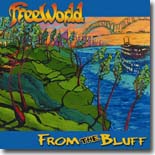 Remember
those good old horn-driven R&B bands in the 1970s,
like Tower of Power or Average White Band, who mixed
soul with upbeat lyrics with jazz and funk?
FreeWorld, out of Memphis, continues that great
tradition into the 21st Century. They’ve been around
since 1987 with their enthralling mix of Memphis,
New Orleans, and the West Coast, and feature
78-year-old jazz sax legend Dr. Herman Green, who
has played with Miles & Coltrane, B. B. King, Lionel
Hampton, Phineas & Calvin Newborn, and Bob Weir (of
the Grateful Dead), among others during his storied
60-plus year professional music career.
Remember
those good old horn-driven R&B bands in the 1970s,
like Tower of Power or Average White Band, who mixed
soul with upbeat lyrics with jazz and funk?
FreeWorld, out of Memphis, continues that great
tradition into the 21st Century. They’ve been around
since 1987 with their enthralling mix of Memphis,
New Orleans, and the West Coast, and feature
78-year-old jazz sax legend Dr. Herman Green, who
has played with Miles & Coltrane, B. B. King, Lionel
Hampton, Phineas & Calvin Newborn, and Bob Weir (of
the Grateful Dead), among others during his storied
60-plus year professional music career.
From
The Bluff (SwirlDisc) is their fifth release and
is produced by Jim Dickinson, whose resume’ includes
producing, performing, and recording with artists
like Bob Dylan, the Rolling Stones, Aretha Franklin,
Sam & Dave, Ry Cooder, and the Replacements.
FreeWorld consists of Green (tenor sax), along with
Richard Cushing (lead vocals, bass, sitar, shaker),
David Skypeck (drums), Brian Overstreet (guitars),
E. J. Dyce (vocals, trumpet, maracas), and Captain
Phil McGee (alto & tenor sax).
Early
highlights include the upbeat “Keep Smilin’,” the
punchy “Give It Back,” and “Down On The Bluff”, a
nice laidback piece with lead vocals by Harold
“Sundance” Thomas and slide guitar from Luther
Dickinson, lead guitarist with the Black Crowes and
the North Mississippi Allstars. The disc jumps into
a jazz direction with the next few tracks, including
the instrumental “Samurai,” and “Spinning Around,”
which serves as an autobiographical piece on the
band’s beginnings and history. “Monkey Suit” is a
torrid funk workout, and “Spartacus” is another
instrumental that sounds like a muscular meeting of
Memphis and late ’60s Miles Davis, with the added
bonus of Cody Dickinson’s electric washboard for
good measure.
Speaking
of bonuses, there’s a “Bonus” 11th track, “Save Our
Soul,” a fantastic tribute to the music that made
Memphis famous in the ’60s that features vocalist
James Govan in a pure soul mode, plus Hope Clayburn
on sax, Steve Dolan on trumpet, and Rick Steff on
Hammond B-3.
25 to 30
years ago, music like this wasn’t hard to find. It
made you dance and made you feel good. Somehow, over
time, it fell out of favor and basically dropped off
the musical map. With their mix of soul, R&B, jazz,
and rock, FreeWorld brings it all back like it used
to be, and suddenly it’s like it never went away in
the first place.
---
Graham Clarke
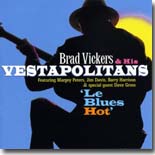 Brad
Vickers is best known as a blues bassist, and has
backed up many blues artists during his career.
After years of being in the background, he decided
to come out front, playing guitar and singing on
Le Blues Hot (ManHatTone), his first project as
a leader of the Vestapolitans.
Brad
Vickers is best known as a blues bassist, and has
backed up many blues artists during his career.
After years of being in the background, he decided
to come out front, playing guitar and singing on
Le Blues Hot (ManHatTone), his first project as
a leader of the Vestapolitans.
This
exhilarating collection encapsulates several genres
of roots music, including blues, jazz, and ragtime,
and features 20 tracks, 12 of which are original
compositions. The Vestapolitans include Big Frank &
the Healers’ Margey Peters (bass, fiddle,
percussion, vocals), Jim Davis (clarinet, tenor
sax), Barry Harrison (drums and percussion), and
emerging star Dave Gross (guitar, upright bass),
along with V. D. King, who plays percussion on one
track. Vickers does a wonderful job on guitar and
has a nice, soothing voice that is a perfect fit
with the material.
Listening to the disc, it’s obvious that Vickers and
company had a ball recording it. There are covers by
Tampa Red (“Give It Up, Buddy”), Big Joe Williams
(“Baby, Please Don’t Go”), Reverend Gary Davis
(“Hesitation Blues”), Jimmy Reed (“It’s Gonna Be
Me”), and Big Jay McShann (“Hands Off”). What may be
most impressive is that the group’s original tunes
fit so seamlessly with the older songs. Highlights
include “I Don’t Want To,” “Up From The Bottom,”
“Our Real Good Thing (…Gets Better Every Day),” a
duet with Peters, and “’A’ Rag.” There are also two
nice tributes to influences, one for Tampa Red
(“Hudson’s Stomp”) and one for Jimmy Reed (“Boogie
for Jimmy Reed”).
Le
Blues Hot is just what the doctor ordered for
fans needing a fix of old-timey blues, jazz, and
ragtime.
---
Graham Clarke
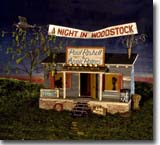 Paul
Rishell and Annie Raines first joined forces in
1992, when Raines sat in with Rishell in a Boston
bar. The result has been a productive relationship
that has paid off with several U.S. and European
tours and a set of well-received CDs (including the
2000 Handy Winner for Acoustic Blues Album of the
Year, Moving to the Country). A Night In
Woodstock (Mojo Rodeo) is the duo’s first live
recording, taped at the Joyous Lake at Woodstock, NY
back in 2005.
Paul
Rishell and Annie Raines first joined forces in
1992, when Raines sat in with Rishell in a Boston
bar. The result has been a productive relationship
that has paid off with several U.S. and European
tours and a set of well-received CDs (including the
2000 Handy Winner for Acoustic Blues Album of the
Year, Moving to the Country). A Night In
Woodstock (Mojo Rodeo) is the duo’s first live
recording, taped at the Joyous Lake at Woodstock, NY
back in 2005.
Rishell
has been playing the blues since the early ’70s with
many of the legends like Son House, Brownie McGhee,
Johnny Shines, Sonny Terry, and Howlin’ Wolf, and
enjoyed a solo career before teaming up with Raines,
who picked up the harmonica at age 17 and proved to
be a quick learner. She was soon sitting in with
harp legends like James Cotton, Lazy Lester, Louis
Myers, Jerry Portnoy, Kim Wilson, and John
Sebastian, and serving short stints with the Tarbox
Ramblers and Susan Tedeschi, playing on Tedeschi’s
first three albums.
A
Night In Woodstock was intended to be a part of
a bigger project. Filmmaker Todd Kwait was working
on a documentary about jug band music and was going
to film one of Rishell and Raines’ shows after
seeing the duo with John Sebastian. The date at
Woodstock was just a regular club date, with
keyboardist (and Woodstock resident) Bruce Katz
sitting in. Kwait called and said he would be there
to film with Sebastian, who would also sit in with
the group, and lightning was captured in a bottle
(the date will be released on DVD in early 2009).
Longtime
fans will recognize many of these tunes, including
the original compositions, “Blues On A Holiday,”
“Moving To The Country,” and “Can’t Use It No More.”
Rishell shines on covers of Blind Boy Fuller’s
“Custard Pie,” Tommy Johnson’s “Canned Heat Blues,”
Johnny Winter’s “Dallas,” Jerry McCain’s “Bad
Credit,” and a rocking cover of Lloyd Glenn’s “Blue
Shadows,” featuring Katz on keyboards. Raines
provides stellar support on harmonica and takes the
mic herself for “Got To Fly” and “I’m A Lover, Not A
Fighter,” and Sebastian joins the pair on “Can’t Use
It No More” and “Orange Dude Blues.”
Raines
and Rishell’s bandmates also deserve a nod. Reed
Butler (bass), Billy MacGillivray (drums), and Chris
Rival (electric guitar) provide solid backing.
This is
a superb set with marvelous sound and performances.
A Night In Woodstock is further proof that
Paul Rishell and Annie Raines are two of the best in
Country Blues today.
---
Graham Clarke
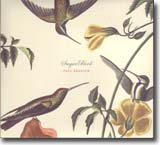 Paul
Reddick’s musical palette includes not only
blues, but jazz, soul, pop, rock, and folk. His
catalog of previous releases show an amazing
dexterity in blending and mixing these styles
together, as heard in a fine retrospective, Revue,
that was released a couple of years ago of his solo
career and his groundbreaking work as a member of
the Sidemen.
Paul
Reddick’s musical palette includes not only
blues, but jazz, soul, pop, rock, and folk. His
catalog of previous releases show an amazing
dexterity in blending and mixing these styles
together, as heard in a fine retrospective, Revue,
that was released a couple of years ago of his solo
career and his groundbreaking work as a member of
the Sidemen.
The
cover of Reddick’s latest release, Sugarbird
(NorthernBlues Music), is a picture of mango
hummingbirds done in the early 1800s by John James
Audubon, the famed Louisiana ornithologist,
naturalist, and painter. This seems appropriate,
since Reddick’s performances bring to mind a sultry
Louisiana night spent on a porch listening to a
moody set of blues. Producer Colin Linden’s efforts
bring to mind the work of another Canadian producer
from not so long ago, Daniel Lanois.
The set
is a mixture of slow, reflective songs and hearty
blues rockers. Some of the slower songs are stunning
in their beauty, including “I Will Vanish,” “Blue
Wings,” and “John Lennon In New Orleans.” Faster
paced highlights include ”Morning Bell” (featuring
Garth Hudson of The Band on accordion), “Devilment,”
with Linden’s rockabilly guitar break, and “It’s
Later Than You Think,” and the positively bluesy
“Block of Wood,” which features Reddick’s marvelous
harp playing.
Vocally,
Reddick ranges from a sweet whisper to a soulful
growl. His harmonica work is, as always, top of the
line. Sugarbird is an example of how great
music is supposed to be put together, with
outstanding performances, first-rate songwriting,
excellent production, and a singer who’s in a class
by himself.
---
Graham Clarke
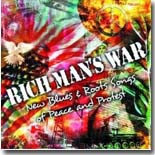 I have
not been a big fan of protest music in the past for
several reasons. 1) Any time you do a protest song,
you risk losing half your audience, 2) the songs
often sound dated in later years, 3) what if the
passage of time shows that your views were maybe not
the right ones, and my personal favorite, 4) many
fans like to escape from discussions of politics and
current events when they listen to their favorite
music. Your mileage may vary, but as far as my
personal listening preferences go, let’s just say
I’d rather hear Trent Lott do a reggae album than
listen to most protest records, regardless of
whether I agree or disagree with the politics
involved.
I have
not been a big fan of protest music in the past for
several reasons. 1) Any time you do a protest song,
you risk losing half your audience, 2) the songs
often sound dated in later years, 3) what if the
passage of time shows that your views were maybe not
the right ones, and my personal favorite, 4) many
fans like to escape from discussions of politics and
current events when they listen to their favorite
music. Your mileage may vary, but as far as my
personal listening preferences go, let’s just say
I’d rather hear Trent Lott do a reggae album than
listen to most protest records, regardless of
whether I agree or disagree with the politics
involved.
In the
past, there have been many songs of protest within
the blues genre. J. B. Lenoir made a career of
protest songs, as did others like Robert Pete
Williams, Bukka White, Josh White and Leadbelly, but
usually, blues artists have stuck to its basic
themes over the years. Certainly, this era in our
country’s history is one of the most controversial,
with plenty of reasons for protest on both sides of
the aisle. Artists from all genres have taken on
songs of protests in recent years, but it seems that
more blues artists are getting in on the act these
days. Ruf Records has released a compilation called
Rich Man’s War: New Blues & Roots Songs of Peace
and Protest.
Rich
Man’s War is the first compilation of protest
songs focusing on the blues genre. It features
tracks by Ruf artists like Bob Brozman (the scathing
“Follow The Money”) and Candye Kane (“Jesus and
Mohammed”), but also collects materials from other
labels like Alligator (Guitar Shorty’s searing “We
The People” and Eddy Clearwater’s “A Time For
Peace”), and JSP (Michael Hill’s reggae-tinged “Fear
Itself”).
Others
making contributions are Doug MacLeod (“Dubb’s
Talkin’ Politician Blues”), Charlie Wood & the New
Memphis Underground (a jazzy “You Don’t Really Wanna
Know”), and Pat Boyack (the satirical “Mr. Wesola’s
Lucky Number Dream Book Part II”). Though advertised
as a blues compilation, there’s also a track by
bluegrass legends Norman and Nancy Blake and one by
satirist Roy Zimmerman.
As
stated above, how much you like this collection
really depends on either how much you like protest
music or whatever your political leanings may be,
but Rich Man’s War is a pretty solid, diverse
set of songs that mix protest and humor very well.
Fortunately, it’s not all fueled by fire and venom,
but mostly served with a wink and a smile.
---
Graham Clarke
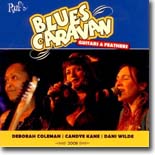 Ruf
Records’ Blues Caravan has highlighted a different
trio of musicians each year since 2006. In ’06,
Aynsley Lister, Erja Lyytinen, and Ian Parker made
up the first Caravan with their release,
Pilgrimage-Mississippi To Memphis. Last year,
Sue Foley, Deborah Coleman, and Roxanne Potvin
released Time Bomb to rave reviews. Both
groups also embarked on well-received U.S. and
European tours in support of their releases.
Ruf
Records’ Blues Caravan has highlighted a different
trio of musicians each year since 2006. In ’06,
Aynsley Lister, Erja Lyytinen, and Ian Parker made
up the first Caravan with their release,
Pilgrimage-Mississippi To Memphis. Last year,
Sue Foley, Deborah Coleman, and Roxanne Potvin
released Time Bomb to rave reviews. Both
groups also embarked on well-received U.S. and
European tours in support of their releases.
This
time around, Ruf brings back Deborah Coleman, a seasoned vet
of the blues scene, along with the irrepressible Candye Kane, and British singer/songwriter/guitarist
Dani Wilde. Guitars & Feathers is a live set
recorded at the Harmonie in Bonn, Germany in January
that features each of the ladies in separate sets
and brings them together for a rousing finale.
The trio
opens with a dandy cover of Ray Charles’ “Won’t
Leave” before turning things over to newcomer Wilde,
who has shared the stage with artists like Jools
Holland and Gary Moore and eschewed a move to the
mainstream to stay with her first love, the Blues.
Judging by her set, the Blues world is the better
for her decision as she rips through a strong set of
four self-penned songs that highlight her powerful
vocals and guitar, including the smoldering “I Love
You More Than I Hate Myself,” and the title track
from her upcoming Ruf release, “Heal My Blues.”
Although, Wilde is a tough act to follow, Kane is
more than up to the task, as she cruises through a
five-song set of her familiar swinging blues. “You
Need A Great Big Woman” is accompanied by one of her
entertaining monologues about the merits of
full-figured ladies. “Crazy Little Thing” is a
hard-rocking number from her most recent release,
Guitar’d & Feathered, along with “My Country
Man” and “I’m Lucky.” Kane was diagnosed with
pancreatic cancer along the time of this concert,
but she underwent surgery during the summer and
seems to be recovering nicely (go to her website,
www.candyekane.com, for regular updates on her
condition).
Coleman’s set, only three songs, gets off to a funky
start with her own composition, “Bad Boy,” before
tackling Jimmy Morello’s “I Got To Know,” from her
latest release for JSP Records, and Luther Allison’s
“Fight.” Coleman’s sinewy fretwork and expressive
vocals are always a pleasure to hear and it would
have been nice to have heard another song or two
from her.
The trio
comes together for the final four songs on the disc,
beginning with Wilde’s sizzling take of Z.Z. Top’s
“Jesus Just Left Chicago.” Kane leads the ladies
through a torrid cover of Etta James’ “Something’s
Got A Hold On Me.” Willie Dixon’s “Whole Lotta
Love,” allows Coleman to really stretch out on
guitar, and the closer, “Rocking On The Blues
Caravan” is a fun track penned by Kane.
Lending
strong support is the band, featuring Govert van der
Kolm (keyboards), Denis Palatin (drums), Michael
Griot (bass), and Laura Chavez (guitar), who really
shines on a couple of solos during the set.
If you enjoyed the first two Blues Caravans
collections, you’ll find plenty to like with
Guitars &Feathers. This series gets better with
each release.
---
Graham Clarke
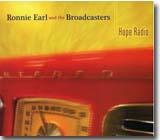 Ronnie Earl released Hope Radio near the
end of 2007. It was well-received and considered one
of Earl’s best albums. It was recorded live in the
studio over two nights with an audience of invited
guests and the end product was Ronnie Earl at his
best. No one currently on the scene is as adept as
mixing jazz and blues guitar as Mr. Earl. He
receives high marks from critics of both genres.
Ronnie Earl released Hope Radio near the
end of 2007. It was well-received and considered one
of Earl’s best albums. It was recorded live in the
studio over two nights with an audience of invited
guests and the end product was Ronnie Earl at his
best. No one currently on the scene is as adept as
mixing jazz and blues guitar as Mr. Earl. He
receives high marks from critics of both genres.
Because
Earl has battled health problems in recent years
(including diabetes), he has not toured in a long
time, so as promised, Stony Plain has released
Hope Radio Sessions on DVD. For fans who have
missed seeing Earl live, this is a wonderful
substitute. Earl is at the top of his game, with an
enthusiastic audience, tearing into tracks like
“Blues For Otis Rush,” a ten-minute track that you
hate to hear come to a close, and “Eddie’s Gospel
Groove,’ which sounds like a lost Santana Woodstock
track.
Both
nights are captured on the DVD, with the first night
mixing blues and jazz in equal amounts with “Bobby’s
Bop,” “Kay My Dear,” and the somber “Blues For The
Homeless.” Night two is a blues thing, with three
tributes featured; the aforementioned “Blues For
Otis Rush,” “Blues For the West Side,” and
“Lightnin’ Hopkins Thing,” a marvelous track that
wasn’t on the CD.
As
mentioned in my CD review last year, this is an
instrumental set that never lags. Earl’s playing is
so powerful and so dynamic that you’re literally on
the edge of your seat at times, waiting for what
he’s going to play next. Plus, he gets sympathetic
backing from his band (Lorne Entress, drums; Dave
Limina, piano, Hammond organ; Jimmy Mouradian, bass;
Nick Adams, guitar; Michael “Mudcat” Ward, basses
and piano). They really give him the space to
operate, but have plenty of time of their own to
shine.
The
bonus features are a ten-minute interview with Earl,
plus an acoustic performance of “I Shall Not Be
Moved.” Simply put, if you’re a Ronnie Earl fan or a
fan of great blues and jazz guitar, this DVD belongs
in your collection.
---
Graham Clarke
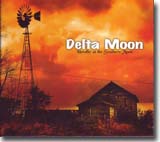 Atlanta,
Georgia-based Delta Moon is a new name to me,
but I’m damn sure that I’m going to be hearing the
name in the future.
Atlanta,
Georgia-based Delta Moon is a new name to me,
but I’m damn sure that I’m going to be hearing the
name in the future.
This
band has not one, but two slide guitar players (Tom
Gray and Mark Johnson), and if you can’t imagine how
that sounds, then you have to give a listen to their
new CD, Howling At The Southern Moon (Blues
Boulevard). The sound that this band makes is punchy
blues-rock – great music to drive long journeys with
as it makes the time just slip away. This album is
one of those that it just compulsive listening,
you’re not always sure that you like it until it
finishes, but you just can’t help but play it. At
times this band reminds me of Creedence Clearwater
Revival in their heyday, but with more of a bluesy
feel mixed in.
The CD
opens with “Clear Blue Flame”, a slow country blues
written by guitarist Tom Gray, and it’s a great
track to open with as it gets the listener’s
attention straight away – there’s a great hook in
the song – “Good moonshine burns with a clear blue
flame,” and I’ve been singing it in my head for
days! The tempo picks up ever so slightly with
another Tom Gray track “Trouble In The Home,” a tale
of love going stale, and then picks up some more
with track three, “Jessie Mae,” co-written by Gray &
Johnson.
On track
8, “You Don’t Have To Go,” the flavour changes
totally with the addition of vocalist Kristin
Markiton – and she’s also there for the next three
tracks on vocals or backing vocals, before Gina
Leigh gets a chance to strut her stuff. The line-up
of the band ebbs and flows throughout the CD, the
only constant members being Gray and Johnson, and
this gives a fresh take on the music all the way
through the album.
This CD
has a good helping of 18 tracks in total, 15 of
which are written, or co-written, by Tom Gray. The
three covers that are included are all top notch –
R.L.Burnside’s “Goin’ Down South”, the Son House
classic, “Preaching Blues,” and a lovely version of
Fred McDowell’s “Shake ‘em On Down. The latter has
been a big favourite of mine for a lot of years, and
this is a particularly good version – I’ve played it
over and over and haven’t got tired of tapping my
feet and fingers to it.
European
blues fans are in for a treat, as this band are
touring the UK and Europe in the spring of 2009. Get
your hands on this CD and see what this band is all
about.
---
Terry
Clear
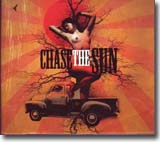 The
self-titled CD from Chase The Sun is the
debut album of an Australian blues band, and it has
been in the US Billboard Blues Album Chart – so you
know that it has to be at least reasonably good.
Previously, there haven’t been many Australian
“blues bands” that have struck me as knowing exactly
what the blues is all about. But here is a band that
changes my mind.
The
self-titled CD from Chase The Sun is the
debut album of an Australian blues band, and it has
been in the US Billboard Blues Album Chart – so you
know that it has to be at least reasonably good.
Previously, there haven’t been many Australian
“blues bands” that have struck me as knowing exactly
what the blues is all about. But here is a band that
changes my mind.
The band
is a trio based in Sydney, Australia, and they have
recently been nominated for five Australian blues
awards – walking away with Best Group & Best Song
awards. Pretty good for a brand new band!
The best song award was, incidentally, for “You
Gotta Go,” which is track one on this album. It’s a
track heavy on the slide guitar, which gets it
straight into my good books, as the slide is played
with dexterity and style.
Jan
Rynsaardt is the guitarist, and he’s backed by Ryan
Van Gennip & Jon Howell; they all met at a jam
session and found they had the same, or similar,
musical interests. The influences would seem to be
Stevie Ray Vaughan, Joe Satriani, Jimi Hendrix, with
a little bit of Allman Brothers and some Country
thrown in for good measure.
I do
have a serious criticism of this CD --- there is
almost no information included with the CD, other
than the names of the guest musicians and the fact
that the trio wrote all 12 tracks on the album. I
think a brief bio of the band would be welcomed,
especially as this is a new band.
That
aside, it’s a good first album, with a nice mix of
tempos and styles and it bodes well for future
output.
---
Terry Clear
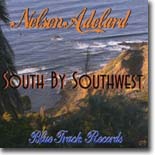 Nelsen
Adelard is one of the more consistently
underrated Southern California blues cats on the
scene today. South By Southwest (Blue Track
Records), his fifth album, continues his trend of
first-rate blues delivered in "no nonsense" fashion.
Nelsen
Adelard is one of the more consistently
underrated Southern California blues cats on the
scene today. South By Southwest (Blue Track
Records), his fifth album, continues his trend of
first-rate blues delivered in "no nonsense" fashion.
Adelard,
who plays guitar, piano and harmonica, is backed by
James Slaughter (bass) and Greg Worley (drums) on
most cuts. He's also joined by the West Coast Band
---John Duzik (bass), Ben Beckley (drums), Mikey Mo
(lead guitar) and Mark Norris (sax).
The disc opens with an up-tempo live cut, "One
More Mile To Go," performed in front of an
enthusiastic audience, featuring some nice harp from
Adelard on the James Cotton cover. The big band
stays on for a rollicking remake of Jackie
Brenston's "Rocket 88"; this song can only be done
justice if it's got a smokin' sax solo, and Norris
is up to the task.
South
By Southwest takes a decidedly downhome turn
after the two live cuts, moving on to doing all
original material with the trio. "I Ain't Gonna Miss
LA" is a pleasant mid-tempo ditty which would sound
good played on the back porch; one could easily
imagine Randy Newman singing this song.
For
anyone who's ever had a new home built that just
wasn't right, "Contractor Blues" will strike a nerve
with you. Adelard sings with such conviction that
you wonder whether this mid-tempo blues is somewhat
autobiographical. He also plays a pretty mean harp.
Adelard sings, "I got doors that won't close ... and
walls that leak ... made me so mad ... well I can't
hardly speak ... hey Mr. Contractor ... I need a
house that I can use ..."
Adelard
shows off both his piano playing and acoustic guitar
picking on the jazzy "Do What You Do" before heading
back more into an electric blues vein with "Rock It
Right." I especially like his bluesy guitar solo
laid over top of a fine shuffle beat and Slaughter's
walking bass line. Adelard shows off his versatility
by also laying down good harp and piano solos.
"Can't
Get Through To You" is a mournful slow blues that's
got a fuller sound than some of the previous cuts.
I'm thinking there's some uncredited accompaniment
here. Regardless, they've got a nice blues thing
going on.
The
album ends with a lazy blues, "Sweet Home In McComb,"
a song that evokes memories of drinking mint juleps
under a cypress tree (regardless of whether or not
you've ever had that experience). Adelard plays some
nice piano here.
Nelsen
Adelard is a performer who deserves a wider audience.
South By Southwest is just further proof that
more blues fans need to be listening to his music.
---
Bill Mitchell